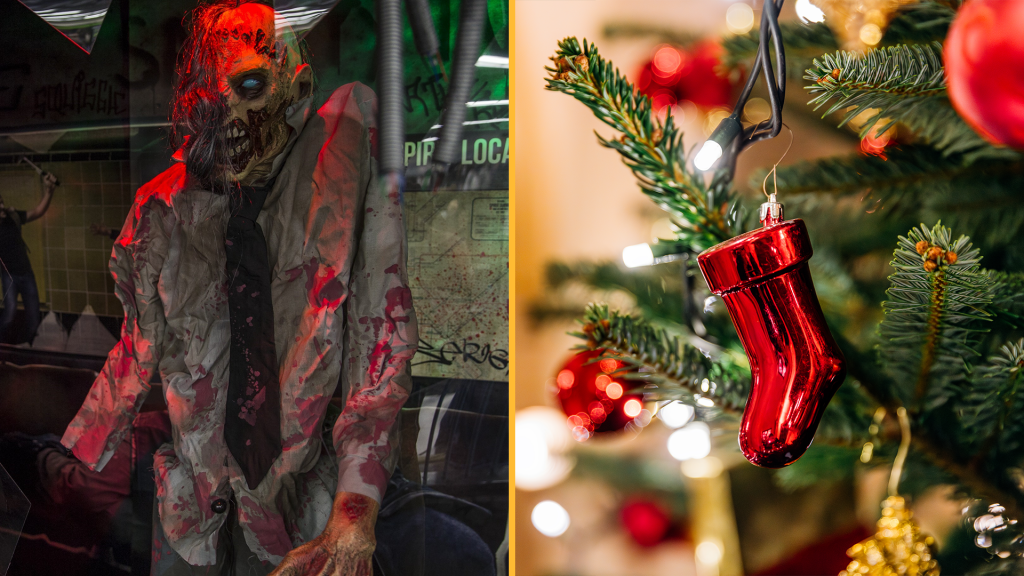Spirit Christmas is a ‘promising 2nd act’, but is it meme-worthy?

Hoping to capitalize on the runaway success of Spirit Halloween, parent company Spencer Gifts recently announced that its spinoff concept, Spirit Christmas, would see nearly four times as many locations as when it debuted in 2024. But the question remains: Can a holly jolly version of the brand’s spooky experience reach the same levels of cultural saturation and internet virality?
“It is early days for Spirit Christmas. It does not yet appear to have the same extent of meme-status or scale as Spirit Halloween,” Venky Shankar, marketing department chair at Southern Methodist University, told Straight Arrow News. “However, Spirit Christmas has the ingredients to become meme-worthy if the brand leans into the social media side, novelty items, and the ‘pop-up takeover’ story, including ‘Creepmas’ items.”
Does Spirit Christmas have that ‘it’ factor?
The most recent iteration of Spirit Christmas debuted in 2024 with a mere eight locations. One year later, Spencer Gifts is opening nearly four times as many –– 30 stores across 12 states. The first of those opened as early as Oct. 17; however, all 30 should be operational by mid-November, a spokesperson confirmed with USA Today.
While Spirit Halloween enjoys widespread national recognition, Spirit Christmas will, for now, largely be relegated to the East Coast and Great Lakes. Nevertheless, if the popularity of Spirit Halloween is any indication, Spirit Christmas could eventually achieve the same level of financial and cultural success.
“Spirit Halloween is a proven, sizeable business (e.g., reported $1.1B in annual revenue for the Halloween brand in 2024),” Shankar said. “For Spirit Christmas — early expansion is promising, but publicly available data do not show it has reached the same scale or cultural saturation yet.”
More than just costumes and decor
But what is it that makes Spirit Halloween, and by proxy, Spirit Christmas, so compelling for American consumers? According to Shankar, it’s a perfect storm of experiential shopping and savvy business practices.
“Spirit Halloween is compelling because it combines a strong seasonal event (Halloween), pop-up urgency/scarcity, immersive thematic experience, novelty, cultural/media buzz, and efficient operational model (short-term leases, vacant real estate),” Shankar told SAN. “Spirit Christmas has many of the same mechanics (pop-up, holiday immersive store, décor/inflatables/experience) and has the potential to be similarly engaging.”
Additionally, whether it’s Halloween or Christmas, the Spirit concept goes well beyond purchasing the holiday’s necessary accoutrements. For many people, visiting the store is, in and of itself, a cornerstone of the season.
“Spirit offers something more than just ‘costumes and decor,’” Shankar said. “It offers a seasonal experience with spectacle, novelty, urgency, and shareable moments that many other retailers either do not deliver or deliver lightly.”
Halloween vs. Christmas
So Spirit might have a proven concept, both in terms of its social relevance and business strategy. But does that necessarily mean that Christmas has the same cultural cachet as Halloween?
“If management executes well, Spirit Christmas could become the next seasonal pop-up phenomenon and deliver strong results. However, there’s no guarantee it will match Halloween’s cultural ubiquity or revenue level,” Shankar told SAN. “For now, it’s a promising second act from the company, not yet the headline act.”
The post Spirit Christmas is a ‘promising 2nd act’, but is it meme-worthy? appeared first on Straight Arrow News.





